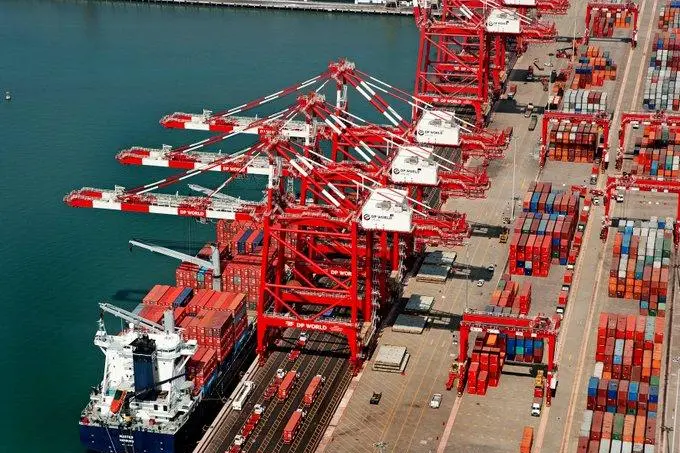PHOTO
DUBAI- Dubai's external food trade in the first half of the year totalled nine million tonnes, representing a value of AED32 billion, Dubai Customs announced today.
According to the latest trade statistics, Dubai’s food imports touched AED22 billion (6.23 million tonnes), while exports reached AED5.5 billion (2.1 million tonnes) and re-exports amounted to AED4.5 billion (733,000 tonnes) in H1, 2020.
H.H. Sheikh Mansour bin Mohammed bin Rashid Al Maktoum, Chairman of Dubai’s Supreme Committee of Crisis and Disaster Management, said the high value of Dubai’s external food trade in the first half of the year reflects Dubai’s role as a major gateway for global trade.
Sheikh Mansour noted that Dubai’s approach is in line with the vision of His Highness Sheikh Mohammed bin Rashid Al Maktoum, Vice President, Prime Minister and Ruler of Dubai, and the commitment of His Highness Sheikh Mohamed bin Zayed Al Nahyan, Crown Prince of Abu Dhabi and Deputy Supreme Commander of the UAE Armed Forces, to ensure that the "UAE food supply chain will never be impacted" and the directives of H.H. Sheikh Hamdan bin Mohammed bin Rashid Al Maktoum, Crown Prince of Dubai and Chairman of Dubai Executive Council.
Dubai’s Food Security Committee, launched in response to the COVID-19 crisis succeeded in ensuring the community had access to abundant food supplies despite the challenges posed by the pandemic, he said.
"Dubai has developed innovative solutions to monitor and strengthen food security. The Dubai Food Security Dashboard, developed by a local government team uses advanced technology to optimise food trade and stocks, manage price control and find alternative food import routes and sources," Sheikh Mansour said, praising the work done by government agencies to develop the Dashboard as a smart tool for supporting Dubai’s food security strategy.
Launched by Sheikh Mansour in June, the Food Security Dashboard uses Artificial Intelligence and data analytics to rapidly measure the five important indicators of food security: the supply index, stock availability, local production, consumption levels, and the cost of vital commodities in the emirate.
The Dubai Customs supports the Dashboard by not only enabling food trading groups and food supply companies to conduct trade but also providing up-to-date data on the trade of food commodities and materials through a messenger system that draws information from customs clearances.
According to statistics issued by Dubai Customs, Dubai’s external fish trade reached 98,000 tonnes in the first half of 2020. Fish imports reached AED755 million (76,000 tonnes), exports around AED145.5 million (9,000 tonnes) and re-exports AED113.2 million (12,500 tonnes). The trade in livestock and meats reached AED3.9 billion (448,000 tonnes). These included imports valued at AED3 billion (313,500 tonnes), exports at AED478.6 million (92,400 tonnes) and re-exports at AED437.6 million (42,000 tonnes).
The trade in vegetables and fruits amounted to AED7 billion (3.4 million tonnes), which included imports valued at AED4.5 billion (2.2 million tonnes), exports at AED1.8 billion (892,000 tonnes) and re-exports at AED 700.8 million (285,200 tonnes).
Ahmed Mahboob Musabih, Director-General of Dubai Customs, said that Dubai Customs facilitates food trade and provides all relevant data to the Food Security Dashboard to help strategic partners plan their operations, make food security-related decisions and mitigate any impact of the global COVID-19 crisis.
Musabih also revealed that the value of Dubai’s external trade in medical supplies in the first half of 2020 topped AED12.4 billion (79,800 tonnes), which included AED9.7 billion (58,100 tonnes) worth of imports, AED293.5 million (7,400 tonnes) worth of exports and AED2.3 billion (14,200 tonnes) worth of re-exports.
© Copyright Emirates News Agency (WAM) 2020.





















